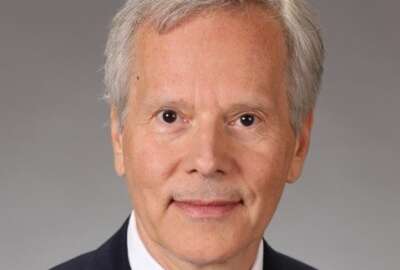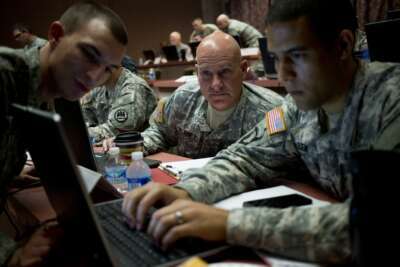
2020 NDAA helped guardsman and reservists make plans for early retirement
The 2020 National Defense Authorization did a lot of things, including righting what guardsman and reservists thought was a wrong. That had to do with credit toward...
Best listening experience is on Chrome, Firefox or Safari. Subscribe to Federal Drive’s daily audio interviews on Apple Podcasts or PodcastOne.
The 2020 National Defense Authorization did a lot of things, including righting what guardsman and reservists thought was a wrong. That had to do with credit toward their early retirement pay. For details, the Federal Drive with Tom Temin spoke to the National Guard Association president, Ret. Army Brigadier General J. Roy Robinson.
Interview transcript:
Tom Temin: Mr. Robinson, good to have you on.
J. Roy Robinson: Good morning, thank you for having me.
Tom Temin: Tell us what was at stake here and what the NDAA fixed for guardsmen and those in the reserves.
J. Roy Robinson: So in 2012 Congress actually created a new mobilization authority that’s referred to as 12304 Bravo. It allowed access to the services, or gave the services easier access to the guard and reserve for some of the missions that they do that may be outside of a theater of war. And the problem with it is, an unintended consequence, is that the demobilization authority didn’t allow for the early retirement that guardsmen get for being mobilized under other authorities. And, we’ve been trying to — we’ve worked toward kind of cleaning up some of the benefits side of the 12304 Bravo authorities in the past. We were actually able to clean up the GI Bill education benefits free and post-employment health coverage. And now we’re able, in the 2020 NDAA to actually, they’ll actually get credit toward early retirement, as they do with the other authorities, that they could be mobilized under.
Tom Temin: And just give us a sense of the types of things they would be called on to do, as you mentioned outside the theater of war under 12304 Bravo.
J. Roy Robinson: So they could be sent to Bosnia. They could be sent to the Horn of Africa. They could be sent to other places, like the Sinai, where there’s been peacekeeping missions for extended periods of time. They could actually be deployed stateside in response to a federal requirement under 12304 Bravo.
Tom Temin: And what’s your sense of how many times this happened? And do we have any idea of how many guardsmen and reservists might have been affected?
J. Roy Robinson: I don’t know what the number is. You know, initially, when the authority was originally established, it was scarcely used. As the services got more comfortable with it, they began to use it more routinely. So there’s numbers of both service members throughout our formations that have been affected. Maybe they’ve gone down Central America? They’ve done some of the humanitarian missions, they’ve responded to crisis overseas. And the thing that’s significant is that they may be actually working with active duty counterparts doing the same job in the same place, but because they’re under this specific authority, they didn’t get the same benefits to include the early retirement pay and some of the education benefits.
Tom Temin: Do you think that that omission originally, when Congress created 12304 to leave out their retirement pay, was that a policy or just simply by mistake? Because laws do sometimes have flaws.
Roy: I think it was an omission. I think it was an unintended consequence when they developed the authority. If you look at all the the statutory authorities that reservists and National Guard members can be mobilized and deployed under, it is a huge, sometimes complicated process. And I think the Congress with good intentions on establishing a new authority, they didn’t — they weren’t able, didn’t realize some of the things that they didn’t get done. That we’ve kind of been cleaning it up. But I think it was just a unintended consequence of a very extensive document and a big change.
Tom Temin: We’re speaking with Ret. Army Brig. Gen. J. Roy Robinson, president of the National Guard Association of the United States. And what’s the effect of getting this credit toward retirement pay? How does that actually work with someone whose main job is not in the military services?
J. Roy Robinson: So if you think about it, historically, guardsmen and reservists with 20 years of good service, they draw their retirement pay at age 60. Well, in 2008 Congress passed a law based on the utilization of the Guard and Reserve and the time that some of our soldiers and everyone was spending away from their job in their home. And basically what it did is it enabled them to receive the retirement pay three months earlier for every 90 days that they are mobilized prior to age 60. So as they accumulate those 90 day blocks, then they moved back from age 60 on the date that they will actually be eligible to draw their retirement, some as early as 59, 58 — some cases even even less.
Tom Temin: What is your sense of the trends in how much they are deployed in the last 10 15 years? Because it seems like more and more.
J. Roy Robinson: You know, I think it’s the world we live in. I think the services understand both the Army and the Air Force that, there’s no way that they could meet the requirements of the national defense strategy and do the things that the country is asking of them without leaning heavily on the members of the National Guard and Reserve. You know, National Guard members come from all kind of background, some of several active duty, and they want to finish their career in the Guard. But the services understand very clearly now, based on kind of situation that we’re in as a country that they have to have the Guard be able to meet the mission requirements. You know it wasn’t necessarily that way 25 years ago. But it has been that way for the last 19 years. It’s probably gonna be that way into the foreseeable future.
Tom Temin: And looking ahead to 2020 and 2021, anything else on your agenda that you feel Congress can address with respect to the guardsmen and reservists?
J. Roy Robinson: You know, we want to continue to talk to the Congress about the idea that without regard to the service component that a member serves in, their benefits should be similar. They should be the same. You know, I can’t conceive that — we shouldn’t be in a position as the country that we are and what we’re asking of our service members without regard to component, that we wouldn’t provide them all with TRICARE insurance, health insurance, which would, number one, raise the medical readiness. But it also is just, that should be just a benefit of the service and the ask that the country is doing now. We want to continue to talk about suicide prevention. This is something, the mental healthcare space that we need to continue to focus on. You know, we continue to have dark days throughout our formations were some of our members may be in situations where they take their own life, and we want to continue to try to do everything that we can to help them to prevent those tragedies from happening. There’s some thing’s coming in terms of, you know, I think if some of our civilian employers support our service members for multiple deployments, yeah, I can envision that eventually it would be a good thing to offer them some tax benefits to where, if an employer has a service member who’s away for, you know, six months that they get a certain level of tax benefit for supporting that service member and allowing him to go off and serve the country. And that tax benefit could grow based on the number of deployments that he supported that member on and the amount of time that that member actually spends away from the away from the job. You know, if you think about it, it’s been pretty tough. I mean small businesses really supported the National Guard and what we’re required of him. And if we were able at some point in time to offer TRICARE as a full-time medical benefit to all service members and then we were able to offer the employers who support us and everything that we do with some tax incentives, you know it may get to the point where some of the small businesses are actually seeking the employment of some of our National Guard members. And they should be rewarded for the kind of support that they lend to the National Guard. We could never do it without employers who were with us in the fight, so to speak.
Tom Temin: A solid agenda. Ret. Army Brig. Gen. Jay Roy Robinson is president of the National Guard Association of the United States. Thanks so much for joining me.
J. Roy Robinson: Thank you Tom for having us. Thank you so much.
Tom Temin: We’ll post this interview at www.federalnewsnetwork.com/FederalDrive. Hear the Federal Drive on your schedule. Subscribe at Apple Podcasts or Podcastone.
Copyright © 2025 Federal News Network. All rights reserved. This website is not intended for users located within the European Economic Area.
Related Stories





